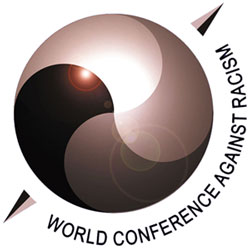
UNITED NATIONS (FinalCall.com) – Next year the United Nations Human Rights Council is scheduled to convene a conference on implementing the Durban Declaration and Program of Action, the final action-oriented document from the World Conference Against Racism held in South Africa seven years ago.
Trouble is brewing with several western nations trying to derail the gathering, commonly referred to as “Durban II,” and scheduled for April 2009 in Geneva, Switzerland.
Western nations condemned the results of the first anti-racism conference, but reparations advocates are pushing the declaration, which includes recognition of slavery and colonialism as crimes against humanity and the need for restitution.
According to the UN, the 2009 conference will identify concrete measures and initiatives that can and should be taken to combat racism, racial discrimination, xenophobia and other forms of intolerance.
The Durban Declaration, named for the site of the World Conference Against Racism in 2001, is viewed as a blueprint to combat racism and racial discrimination, according to the UN Human Rights Council.
“Enacting laws and policies, establishing national action plans, providing remedies to victims and conducting public awareness and education campaigns were among the recommendations adopted seven-years-ago through the DDPA,” observed Bacre N’Diaye, a representative of the UN High Commissioner for Human Rights.
The United States, Canada, Australia, France, the Netherlands, Britain and Israel have threatened to boycott Durban II claiming that anti-Israel tones by some nations would likely bring the review conference to a low point and hurt the image of participants and the United Nations.
At the UN, the U.S. laid out its argument for not wanting to participate. “The outcomes of the WCAR in 2001 were deeply flawed and divisive,” officials said. The U.S. delegation argued the follow-up meeting would be more of the same.
“We see no change in the prospect of it being a biased one-sided, unproductive discussion,” said Benjamin Chang, a spokesman for the U.S. Mission. State Department officials have said attendance in Geneva would be left to the next administration.
“Durban II isn’t about anti-semitism, which really has no place in the discussion period, as far as we are concerned,” said Dr. Conrad Worrill of the National United Black Front. “Our focus in participating in Durban II is to make sure that the international community holds steadfast to the declaration in the DDPA that the trans-Atlantic slave trade, slavery and colonialism are crimes against humanity; recognition of the economic basis of racism; and reparations for the descendents of the victims of these crimes,” Dr. Worrill told The Final Call.
The National Black United Front and the Brooklyn-based December 12th Movement and International Secretariat led the “Durban 400,” the number of American Blacks that attended the World Conference Against Racism.
Roger Wareham, an attorney and December 12th Movement member, spoke at a Prep Com for the 2009 conference that was held in Abuja, Nigeria on Aug. 24.
Mr. Wareham reminded delegates that the Western European & Other States Group took the “unprecedented” step of trying to reopen the Durban Declaration for reconsideration, mainly because of the demand for reparations. “The failure to implement the DDPA is the continuation of the WEO Group’s campaign to make the World Conference Against Racism go away,” Mr. Wareham said in Abuja.
The UN General Assembly, in establishing the 2009 review conference, pointedly stated that its focus would be on implementation of the Durban Declaration and not re-opening the document for further considerations.
“The final Declaration and Program of Action, though a consensus and thus a compromise document, was still a victory for the African continent and the African Diaspora,” Mr. Wareham said in Abuja. “This Prep Com provides us the opportunity to set an agenda to combat racism and racial discrimination and to ensure the enforcement of our collective human rights to development and self-determination in the 21st century,” he added.
Supporters of the 2009 meeting received a boost on Sept. 8 in Geneva, when the new UN human rights chief, Navanethem Pillay, a South African, criticized the threat by Western nations to stay away. “I urge those governments that have expressed an intention not to participate to reconsider their position,” she said.
Mr. Wareham told The Final Call that Ms. Pillay’s position was a shot in the arm for Durban II. Another shot in the arm was recent news that Italy would pay reparations to Libya for damages done during colonization, he said. “That is why we added colonialism into the language of the DDPA, which is truly a crime against humanity,” Mr. Wareham said. One of the main points made during the Abuja Prep Com was that African nations are not going to back off their call for justice that is plainly laid out in the Durban Declaration, he said.












